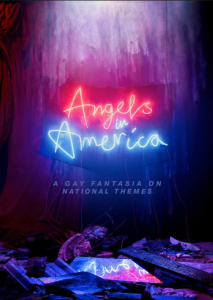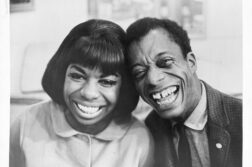 Angels in America: A Gay Fantasia on National Themes
Angels in America: A Gay Fantasia on National Themes
Part One: Millennium Approaches
Part Two: Perestroika
by Tony Kushner
Directed by Marianne Elliott
Lyttelton Theatre, London
4 May—19 August 2017
FROM THE MOMENT Nathan Lane stepped onto the stage as the malign yet also tragic Roy Cohn, owning not only the part, but the huge Lyttelton stage and indeed the entire auditorium, the audience knew that it was witnessing something very special: dazzling theatricality, inspired casting, wit, prescience, wisdom, and a sense of the historic. When the National Theatre first staged Angels in America a quarter of a century ago, it announced the arrival of a major new force in American theater, certainly. But it equally marked a shift in how cultural responses to AIDS generally would come to position themselves, argue politically and engage, seduce yet also confront and make demands of their audiences or readers.

If it’s not instantly clear whether Andrew Garfield and Russell Tovey will have the stamina for the eight-hour Everest climb that is Tony Kushner’s two-part contemporary classic, that is understandable. Put Eugene O’Neill’s two most epic plays back-to-back, and you’re still only approaching Angels in America’s ambition and scale. In fact, Garfield proves both credible and extremely moving as Prior Walter, Kushner’s desperately sick hero, abandoned lover, and prophet. The discomfort with which he receives the news of his “anointment” by the Angel at the close of Millennium Approaches reminds us that Kushner’s dramaturgy embraces both the naturalistic and the absurd. Garfield juts, stares, and jabs his fingers at his predicament, paradoxically becoming more palpably alive when bedbound while his character is being psychically stretched through the hurt, confusion, and shock of his predicament.
Lane’s performance in this production is simply jaw-dropping. Kushner’s pleasure in writing such a dark character is evident: he gave Cohn a lot of the best lines. And the more Lane camps it up, the more the audience is compelled to accept that, in the stage-play world, immorality may thrive. The devil entertains—and is applauded for it. Lane understands that Cohn is simply doing what is natural to narcissists; with the wipe of a cuff, he reinterprets his own dependency, sexual marginality, and isolation as positions of strength. History can be a strange and unlikely thing, and naturally Cohn’s role in mentoring the young Donald Trump offers Lane a golden opportunity to pitch for the prescience and relevance of Kushner’s play. While never adopting Trump’s own odd manners or style of self-presentation, Lane convincingly offers us someone who could, and would, have shaped the U.S. presidency in his own diabolical direction.
One element of Angels that has worn less well is its apocalyptic theme, a very tangible fear in our culture in the 1990s but something that we can scarcely feel today. When Ethel Rosenberg warns Roy Cohn that “History is about to crack wide open,” the contemporary audience may knowingly dissent. The 21st century’s march of globalization and digital culture has not so much broken historical narratives as seen them simply stretched further and repeated more widely than before. AIDS, of course, has continued to be perpetuated as a changing medical crisis: as medical responses improve, so much the greater are the healthcare challenges facing the West with an ever larger volume of HIV+ survivors to support, some experiencing a range of related medical conditions or side effects. In the developing world, the epidemic’s contours remain quite different, but the sense of unfinished business applies just as strongly.
These things are not the subject of Kushner’s plays, obviously, but they mediate how we respond today. A vital consideration here is the way in which the intervention of combination therapy treatments from around 1996 transformed the epidemic, rendering it less taboo socially and less visible politically. Felice Picano’s AIDS-related novel Like People in History may have suggested the ways in which American gay men in the midst of gay liberation and then the AIDS crisis wished to be considered, but in that account—and many others in fiction, drama, and film—the rendering of social context and political import was uneven. By contrast, Kushner showed the world to be fully relative, with the sustained impact of one action upon others entirely absent and distant from it somehow suggesting a staged version of chaos theory. He also critiqued himself, showing how the dramatist can shuffle and invent and fix things to make this seem so, reanimating the dead, allowing fantastical figures to coexist alongside the real. Kudos to Susan Brown for a truly mesmerizing performance as Rosenberg, the hard-left adversary whom Cohn was instrumental in having executed, who returns as her ghost to sing the Kaddish to the abandoned, dying Cohn.
The staging of the two plays in Marianne Elliott’s production is occasionally a mixed blessing. Ian MacNeil’s set for Millennium Approaches is unhelpfully like a set of discarded boxes, littering the wide stage and oppressively overshadowed by an unexplained spaceship-like carapace above. The result is that each scene suggests, quite wrongly, the separateness of the lives of Kushner’s characters, whereas Kushner’s script insists on interrelatedness and mutual relevance. It may be that Elliott and MacNeil wanted simply to make a clear differentiation between their production and Declan Donnellan’s 1994 staging of the two-part play here. However, my strongest memories of Donnellan’s staging remain the scenes in which paired conversations overlapped on an open stage, mutually commenting and counter-stating individual assumptions and perspectives.
More successful, however, is the reconceiving of the Angel as a bedraggled, improvised, and markedly sinister outsize bird. Where earlier versions of Angels have interpreted the Angel as Kushner’s warning against or reproach toward simple solutions, marketers’ promises, or religious or nationalistic pieties, Elliott furnishes the Angel with a cohort of puppet-like human dancers to propel her into the air. Her Angel is a reflection, surely, of a very contemporary mood, one in which those who promise deliverance and redemption from on high strike a distinctly unpersuasive note: leaders whose appearance undermines the confident claims they spout. By contrast, Prior is given the speech that affirms the poignancy of Kushner’s play and the timeliness of its revival: “This disease will be the end of many of us, but not nearly all, and the dead will be commemorated and will struggle on with the living, and we are not going away. We won’t die secret deaths anymore. The world only spins forward. We will be citizens. The time has come.”
Richard Canning is the editor of Vital Signs: Essential AIDS Fiction (2007).






